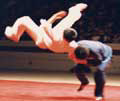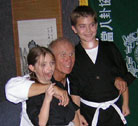

Kung Fu
Tai Chi Chuan
(281) 682-3387
are offered at Wang's Martial Arts and
cover such things as:
- Standing
- Breathing
- Proper Movement
- Forms training
- Techniques training
- Weapons training
Tai Chi Class Schedule
Tue. 11:00 am - 12:00 noon
Sat. 12:00
noon - 1:00 pm
Mon./Wed./Fri. 5:00 - 6:00 pm
Wed. 7:00 - 8:00 pm
Thurs. 8:00 - 9:00 pm
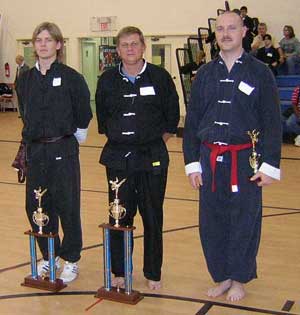
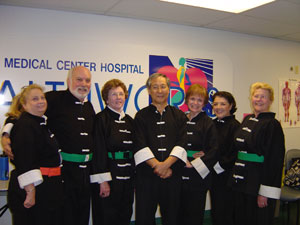
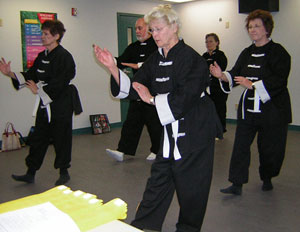
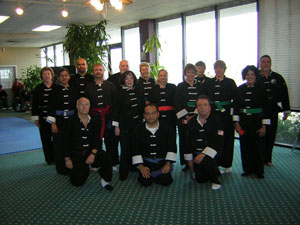
Some background
on Tai Chi Chuan
Tai Chi Chuan consists of a
carefully choreographed sequence of slow, light, continuous, circular,
and rhythmic movements which are performed in such a way as to stimulate
every major system in the body (muscular, respiratory, circulatory, nervous,
digestive, and excretory). Tai Chi Chuan is symbolized by the Tai Chi
diagram, which represents the dual relationships in nature, such as light
and dark, soft and hard, hot and cold. It is by the attainment of a real
balance between two extremes that harmony is achieved. The effect of practicing
Tai Chi Chuan regularly is to establish an equilibrium of the vital systems
of the human being and thus bring harmony to the mind, body, and spirit.
The twenty minute exercise
is performed without the use of external strength or speed, but rather
enhances the development of keen concentration and body awareness so that
students of all ages and sizes may learn to employ timing and balance
in defensive moves against an opponent. The movements in Tai Chi Chuan
consist of blocks, grabs, kicks, and punches that are performed in a slow,
continuous, and relaxed manner which, with diligent practice, become automatic
and extremely effective when used in self-defense.
To practice Tai Chi Chuan, one needs to wear comfortable clothing and to find a space approximately twenty feet square, preferably away from noise and other distractions. Students are encouraged to practice every day, twice a day, in the morning before breakfast and in the evening, an hour before bedtime. Because the essence of Tai Chi Chuan can only be achieved through total concentration and the relaxation of all muscles in the body, everyday worries will be put aside, and after completion of the Tai Chi Chuan exercise, there will be an absence of fatigue and a feeling of renewed vigor. It is said that whoever practices Tai Chi Chuan correctly and regularly twice a day over a period of time will gain the pliability of a child, the health of a lumberjack, and the peace of mind of a sage.
Tai Chi Chuan Schedule ( All Ages )
- Tue./Sat. 12:00 noon-1:00 PM
- Mon./Wed./Fri. 5:00-6:00 PM
- Wednesday 7:00-8:00 PM
- Thursday 4:00-5:00 PM
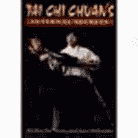 Tai Chi Chuan book
Tai Chi Chuan book"Energy Times" magazine: October 2004
But in study after study, Tai chi- "moving harmony" in Chinese- has provided a powerful array of health benefits. For example, tai chi has helped:
· People with rheumatoid arthritis develop greater range of motion in affected joints.
· Protect seniors against the virus that causes shingles, a painful skin condition.
· Make life easier for people with fibromyalgia, a pain disorder linked to chronic fatigue.
· Reduce blood pressure and total cholesterol, and increase HDL (good) cholesterol.
· Improve aerobic capacity, balance control and sleep quality among older people.
Proponents point to tai chi's effects on qi, the vital energy flow within
everything and everyone, as the source of its strength. "The circulation
of energy is vital to health," says Master Lam Kam-Chuen, an international
tai chi authority and author of Tai Chi for Staying Young (Fireside).
He says that tai chi's movements contract and release muscles throughout
the body, restoring flexibility and encouraging blood flow.
While aerobic activities (such as walking) and weight training certainly
aren't going out of style, many people- especially older folks whose health
makes vigorous exercise problematic- prefer tai chi's slower pace.
Slower doesn't mean easier, though' tai chi emphasizes precise adherence
to prescribed patterns of motion (rooted in centuries-old martial arts
forms) through concentration and focus, particularly one's breath.
Tai chi combines this concentration with relaxation: "Learning to
relax is the essence of tai chi," says Master Kam-Chuen. "Many
of the pressures of daily life mane that our whole system is on constant
alert, even in sleep," which he says leads to such health hazards
as cardiovascular trouble, depression, migraines and asthma, along with
garden-variety aches and pains. Master Kam-Chuen also notes that studies
have shown a link between tai chi and improved immune defenses.
Part of tai chi's appeal lies in its lack of equipment; throw on some
loose clothes and you're good to go. What's more, the low-impact nature
of tai chi exercises mean less stress on older, achy joints. Of course,
as with any fitness program, you have to listen to your body during tai
chi sessions and not overdo your exercise.
Like yoga, tai chi comes in many different forms; yang is the most popular.
Many people find the forms easier to learn with instruction. To find a
class near you, check with a local martial arts studio

